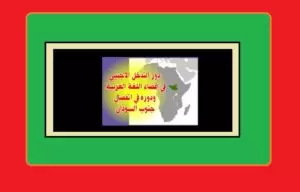دور التدخل الأجنبي في إقصاء اللغة العربية ودوره في انفصال جنوب السودان رؤية تحليلية
دور التدخل الأجنبي في إقصاء اللغة العربية ودوره في انفصال جنوب السودان رؤية تحليلية
تعد مشكلة اللغة والهوية الثقافية من أهم المشكلات التي ظهرت وقام بترسيخها الاستعمار البريطاني مما أدي إلى تزايد الصراعات بين الشمال والجنوب السوداني وأدي في النهاية إلى الأنفصال، فاذا اردنا التعرف على الاوضاع اللغوية في جنوب السودان باعتبار ان وحدة اللغة عامل هام من عوامل الترابط ،

فاننا نجد انه في عام 1956 كان الجنوب يتحدث اثنتى عشرة لغة واكثر من مائتي وخمسين لهجة مما كان سببا في تعميق التفتت الثقافي وسببا من اسباب ترسيخ القبلية ، وعدم التفاهم بين الأحباش المختلفة في الجنوب ، وكانت اللغة العربية قد عرفت طريقها إلى الجنوب منذ الربع الأول من القرن التاسع عشر، وكانت مؤهلة بأن تكون اللغة السائدة في المنطقة، بحكم كونها لغة الحكم والحضارة والتجارة في السودان المصري، لكن ما ان حل الاستعمار البريطاني فبدأ يعمل على ترسيخ الانفصال بين الشمال والجنوب، ففي يناير 1930 رفع السكرتير الاداري لحكومة السودان مذكرة بشأن تحديد السياسة الإنجليزية تجاه الجنوب جاء فيها.
- ضرورة توفير العاملين من غير المتكلمين بالعربية في المجالات الكتابية والادارية والفنية.
- استخدام اللغة الإنجليزية في المعاملات الحكومية ، واحلال الموظفين من أبناء الجنوب محل الشماليين.
وبدأت تطفو على السطح الدراسات التي اعدها رجال الإرساليات التبشيرية لقواعد اللغة الجنوبية تأصيلا لها، حتى تساعد على ايقاف أي تأثيرات عربية إسلامية بل طردها نهائياً من الجنوب.
وقد حرصت الإدارة البريطانية على ترسيخ اللهجات القبلية إلى جانب اللغة الانجليزية لإيقاف المد العربي القادم من الشمال ونجح الاستعمار بذلك في خلق تمايز وتباين الجنوب والشمال، بعد ان كانت اللغة هي أحدى الوسائل لتحقيق الانسجام في الثقافة العامة للمواطنين، فقد كان للسودان الجنوبي سمات عامة وتعددية مختلفة عن الشمال في الثقافة والدين واللغة والاقتصاد والقبائل، ولكن كادت العقيدة الإسلامية ان توحد فكرهم وثقافتهم مثلما حدث في الشمال، ولكن الاستعمار سعى ورسخ التعددية الثقافية في الجنوب.
وسوف تقسم الدراسة إلى:
المحور الأول: توغل الاستمار البريطاني في الجنوب.
المحور الثاني: دور الإرساليات التبشيرية في إقصاء الدين الإسلامي ومن ثم اللغة العربية.
المحور الثالث: اللغة وتأثيرها على تفتت الهوية الثقافية.
المنهج
سوف يستخدم الباحث المنهج التاريخي في تتبع بداية وجود الاستعمار البريطاني ودوره في توسيع الفجوة التاريخية بين الشمال والجنوب السوداني ، وكذلك المنهج التحليلي لتأثير توسيع تلك الفجوة على عملية انفصال الجنوب.
الكلمات الدالة : جنوب السودان – اللغة العربية – الهوية الثقافية
منال البطران[1]
[1] باحث علوم سياسية وطالب بمعهد الدراسات العربية
اللغة العربية في مدينة كاتسينا – مشاكل وحلول
The role of foreign intervention in the exclusion of the Arabic language and its role in the secession of South Sudan, an analytical view
The problem of language and cultural identity is one of the most important problems that emerged and was established by British colonialism, which led to the increase of conflicts between North and South Sudan and ultimately led to separation, if we want to identify the linguistic situation in South Sudan as the unity of language is an important factor of interdependence,
We find that in 1956 the South spoke twelve languages and more than two hundred and fifty dialects, which was a reason for deepening cultural fragmentation and a reason for the consolidation of tribalism, and the lack of understanding between the different Ahbash in the South, and the Arabic language had known its way to the South since the first quarter of the nineteenth century, and was qualified to be the dominant language in the region, by virtue of being the language of governance, civilization and trade in the Egyptian Sudan, but once colonialism was dissolved. In January 1930, the administrative secretary of the Government of Sudan submitted a memorandum defining English policy towards the South.
The need to provide non-Arabic speakers in the written, administrative and technical fields.
The use of English in government transactions, and the replacement of employees from the South with the Northerners.
Studies prepared by missionaries of southern grammar began to surface in order to help stop any Arab-Islamic influences and even expel them permanently from the south.
The British administration has been keen to consolidate tribal dialects along with the English language to stop the Arab tide coming from the north and colonialism has succeeded in creating the differentiation and contrast of the south and the north, after the language was one of the means to achieve harmony in the general culture of citizens, the southern Sudan had general features and pluralism different from the north in culture, religion, language, economy and tribes, but the Islamic faith almost united their thought and culture as happened in the north, but colonialism sought and established multiculturalism in the north. South.
The study will be divided into:
The first axis: the incursion of the British form into the south.
The second axis: the role of missionaries in the exclusion of the Islamic religion and then the Arabic language.
The third theme: Language and its impact on the fragmentation of cultural identity.
Curriculum
The researcher will use the historical approach in tracing the beginning of the existence of British colonialism and its role in widening the historical gap between North and South Sudan, as well as the analytical approach to the impact of the widening of that gap on the process of separation of the South.
Keywords : South Sudan – Arabic Language – Cultural Identity
